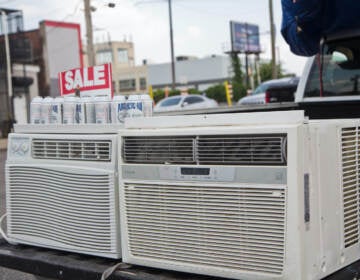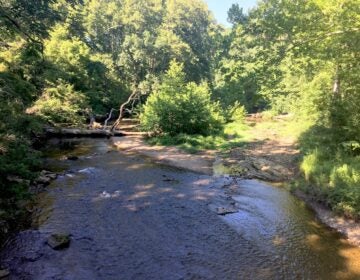Weekly Press: Ninety people attend Sierra Club Marcellus Shale Debate
Weekly Press: Ninety people attend Sierra Club Marcellus Shale Debate
Ninety people squeezed into a Marcellus Shale forum co-sponsored by the Sierra Club on the fourth floor of the Philadelphia Free Library on Monday, March 8th, breaking records for a usually quiet lecture series that typically draws twenty to thirty environmentalists.
The crowd included college professors from Swarthmore and Temple; bicycle-riding and public-transit riding Philadelphians who quickly protested when the audience was chided, “you probably all drover cars here tonight,” and about a dozen landowners whose land, leased or not, is in the Marcellus Shale region of Pennsylvania.
The atmosphere was testy. Brady Russell, speaking on behalf of Clean Water Action, critiqued the Marcellus Shale industry’s comment that “nothing’s in that fracking fluid you wouldn’t have under your kitchen sink.” Russell joked, “A, I don’t drink bleach; and B, I don’t drink diesel and I don’t have diesel under my kitchen sink.”
Russell continued, “This really is a Philadelphia issue. New York City has banned fracking in its watershed. Y’all are drinking out of rivers, both of which have Marcellus Shale right up next to them. And if you think these drillers are good neighbors, think again.”
Kathryn Klaber, spokeswoman for the Marcellus Shale Coalition, which counts over 70 gas-drilling companies as members, presented power point slides with beautiful colored pie charts from a “Penn State University study,” she said. Klaber did not mention that the study in question was funded by the industry. The study concluded forcefully that no severance tax should be imposed on the Marcellus Shale gas drillers. It also used the term “ominous” to describe the idea of applying federal Safe Drinking Water Act regulations on hydraulic fracturing in combination with horizontal drilling in the Pennsylvania Marcellus Shale region.
When Klaber presented a slide showing a quote claiming that no fracturing operation has “ever been tied” to a water contamination incident, a landowner from the back of the room shouted, “That’s not true! You know better…. I’ve been to Dimock, I’ve seen the well that blew up. You should be ashamed of yourself.” Klaber blushed and continued to try to speak over the sound of the landowner’s voice.
Longtime Philadelphia labor leader Tom Paine Cronin spoke up from the audience during the question and answer period. “These claims the industry makes that this is all so beneficial reminds me a lot of tobacco advertisements. Remember, for years while they covered up the medical research, tobacco advertisers said, ‘Four out of five doctors recommend Camels.’ “
Philadelphians Ann Dixon, Norma Van Dyke, Amy Wilson and others at the event gathered signatures for a state moratorium on Marcellus Shale gas drilling, which requires a technology also known as fracking. They also encouraged audience members to write City Council letters asking members to call for a ban on fracking in the Delaware River Watershed. “We want to drink clean water,” Ann Dixon explained. “Period.”
Temple University Hosts Teach-in 9 am – 4 pm Thursday, March 18th
Temple University is providing an opportunity for students, scientists, academics, water resources professionals and activists to learn more about Marcellus Shale drilling on Thursday, March 18th all day long at 1947 N. 12th Street. Temple’s Department of Civil and Environmental Engineering’s Center for Natural Resources Development and Protection stated, “Deterioration of water and air quality is a serious problem threatening the healthy functioning of our nation.” The forum is called, “Marcellus Shale Natural Gas Stewardship: Understanding the Environmental Impact—a Temple University Summit.” Their invitation reads, in full:
“The Marcellus Shale formation is around 7,500 feet deep and covers over 50% of Pennsylvania along with the neighboring states of West Virginia, Maryland, and New York. Recent estimates of the amount of natural gas recoverable using newly developed horizontal drilling and hydraulic fracturing methods approach 50 trillion cubic feet, a volume that could supply the entire United States for about two years. The extraction of natural gas from the formation has attracted great attention within the last year due to environmental concerns.
Please join us for a one-day summit on the issues related to utilization of this natural resource, 9 AM to 4 PM, Thursday March 18th, at the Department of Civil and Environmental Engineering College of Engineering, Temple University 1947 N. 12th Street, Philadelphia PA 19122. A wide range of experts representing environmental groups, government, industry and scientists will discuss the various aspects of gas drilling. The summit will include lectures, panel discussions, and poster sessions, and will make its proceedings public and communicate them to the Commonwealth of Pennsylvania and the City of Philadelphia.
For further information, contact Michelle Smith (EMAIL:ceed@temple.edu, tel: (215) 204-7814). Forum details are also available at www.damascuscitizens.org.
Delaware River Basin Commission extends Public Comment Period to April 12th.
Responding to intense public pressure, the Delaware River Basin Commission decided to seek funding to study cumulative environmental impacts from Marcellus Shale gas drilling in the Delaware River watershed. The Commission also acknowledged the legitimacy of public pressure for them to fully formulate their own set of rules related to Marcellus Shale drilling prior to issuing any permits. In a phone interview on March 9, Commission Deputy Director Robert Tudor said it was “premature to speculate” on whether they might still grant the first fracking permit and first water withdrawal permit in the Delaware River watershed to Stone Energy on May 5th. However, he said “the public participation is having an impact” and indicated that the decision might be deferred until early July.
Taking another step to enable increased public participation, the Commission extended the public comment period on the Stone Energy permits to April 12th, a month longer than they had previously allowed.
The Delaware Riverkeeper Network and other advocacy groups continue to encourage Philadelphia residents, and others throughout the watershed, to provide written comments to the DRBC at Paula.Schmitt@drbc.state.nj.us and to demand that the DRBC hold a downriver hearing so that Philadelphians’ voices may be heard. Any emailed comments must state “Public comment—Stone Energy dockets” in the Subject Heading.
Stone Energy is applying for a permit to frack one well and to withdraw up to 700,000 gallons per day from the West Branch Lackawaxen, a small tributary to the Lackawaxen River, which feeds the Delaware River. Over the five years of the permit, over one trillion gallons could be withdrawn from the headwaters of the Lackawaxen, which the Department of Conservation and Natural Resources just named Pennsylvania’s “2010 River of the Year” due to its pristine condition, beauty, and exceptional biodiversity. “This application would ‘legalize’ the Matoushek well [where Stone Energy previously drilled without a permit] and allow hydraulic fracturing and other gas well development to proceed,” explained Faith Zerbe, a staff biologist from the Delaware Riverkeeper Network. She continued, “We need to tell the DRBC Commissioners not to rush… the 15 million people who rely on the Delaware for water supply and all the living communities—human and nonhuman—dependent on the river [count on the DRBC] to prevent pollution and degradation of our outstanding and irreplaceable Delaware River Watershed.”
WHYY is your source for fact-based, in-depth journalism and information. As a nonprofit organization, we rely on financial support from readers like you. Please give today.






